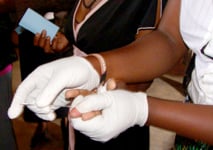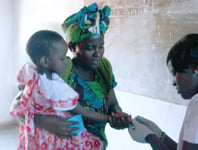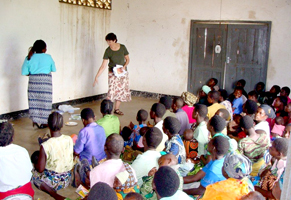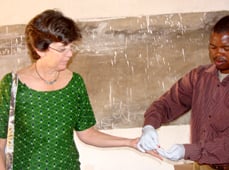(Sept. 23, 2011 - by Ralph Kurtenbach) "Simple" describes the HIV/AIDS tests that Dr. Jerry Koleski and his wife, Elizabeth, administer in the East African country of Malawi. "We just need a drop of blood from a finger stick," said Jerry, explaining the results are available in just minutes.
 For many Malawians who agree to the testing, the simplicity ends there. If it's shown (after a second test for certain confirmation) they have AIDS, the news radically complicates their lives.
For many Malawians who agree to the testing, the simplicity ends there. If it's shown (after a second test for certain confirmation) they have AIDS, the news radically complicates their lives.
This news is shared by trained counselors, according to Elizabeth, whose ministry involves conducting AIDS testing in churches four times per year.
"AIDS is very prevalent in Malawi, yet there is still a considerable stigma attached," she said. "This is especially true in churches. Yet the church is an ideal place for attacking this problem. Most Malawians go to church somewhere."
 The Koleskis serve as HCJB Global Hands healthcare professionals at the Partners in Hope (PIH) Medical Centre in Malawi's capital, Lilongwe. The PIH clinic has registered more than 5,000 HIV-infected patients since 2005. The clinic, in partnership with the UCLA School of Medicine, serves as a training center for U.S. and Malawian clinicians.
The Koleskis serve as HCJB Global Hands healthcare professionals at the Partners in Hope (PIH) Medical Centre in Malawi's capital, Lilongwe. The PIH clinic has registered more than 5,000 HIV-infected patients since 2005. The clinic, in partnership with the UCLA School of Medicine, serves as a training center for U.S. and Malawian clinicians.
Before the Koleskis moved to Malawi, the U.S. couple served in the mission's jungle hospital in Shell, Ecuador. Jerry is a family physician; Elizabeth is a nurse who teaches health education.
The HIV/AIDS testing program that Elizabeth launched with Dr. Jon Fielder is called Tigwirane Manje, which means in the Chichewa language, "Let's Join Hands." Program funding comes from donors, including a foundation administered by Heritage Christian Church in Westerville, Ohio.
 As Elizabeth and a church pastor led a testing campaign in June, both received the AIDS testing as an encouragement for others to do likewise. Church involvement in Malawi's AIDS crisis is mixed, with many churches ignoring the issue.
As Elizabeth and a church pastor led a testing campaign in June, both received the AIDS testing as an encouragement for others to do likewise. Church involvement in Malawi's AIDS crisis is mixed, with many churches ignoring the issue.
Other church leaders even discourage patients from taking their medicine or seeking care, to demonstrate what they deem as a stronger faith. Stopping antiretroviral drugs, however, can result in viral resistance. "We only have a first and second line of medicines," Jerry said. "There is no third line in Malawi."
The Koleskis hope to join efforts with the Church of Central Africa-Presbyterian in community health evangelism. This would integrate community development and healthcare with the gospel, though Jerry adds that "early detection is also valuable, of course. Many patients come to the doctor so late that we are unable to help them and they die."
 The Koleskis say PIH is viewed favorably around Lilongwe because "our community health workers have become known in the community as trustworthy, caring people so we have been asked to help."
The Koleskis say PIH is viewed favorably around Lilongwe because "our community health workers have become known in the community as trustworthy, caring people so we have been asked to help."
A patient's neighbor, for example, was gravely ill with both AIDS and tuberculosis. "Our group went out, brought in the woman and admitted her to our hospital," Jerry said. "Unfortunately, she died about a month later, but not without hearing the good news and experiencing Christ's love through our staff."
Another patient's neighbor was dissuaded by a PIH community outreach worker from abandoning his family. And in yet another word of mouth referral from a patient, a neighbor suffering diabetes and high blood pressure received medical counsel at PIH on living with these maladies and using good nutrition to keep them under control.
Source: HCJB Global
